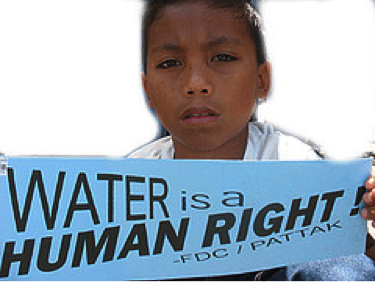Today, countries the world over celebrate UN World Water Day 2012, around the themes of water and food security. But for Asia, which wears the face of global hunger and poverty with about two-thirds of the world’s 1.3 billion poor people residing in the region, it is not a celebration but rather a clarion call to action and resistance against the increasingly predatory moves of private corporations and the North governments behind them.

Only a few days ago, governments and corporations gathered in Marseille, France for the 6th World Water Forum, the tri-annual event organized by the World Water Council, which has close links to the World Bank and multinational companies eyeing huge profits from the very source of all life on this planet. It called for find solutions to water problems, achieving water security and ending « water suffering ».
And find « solutions » they did, in the grand tradeshow of big private corporations that included Veolia, Saur and subsidiaries of the Suez Environnment group of companies such as Aguas de Barcelona, Degremont, Lyonnaise des Eaux, Ondeo, and United Water. They pledged « strategic and sustainable financial planning », mobilizing among others both public budgets and private finance. They spoke of the need for « efficient cost recovery, pro-poor and innovative financing mechanisms, such as appropriate payment for ecosystem services, and private investment », in the same breadth as solidarity, justice and equity. In the double-speak typical of the WWF, they found their corporate event, their market space to directly woo high-level government representatives with their spin, sell their water wares and position themselves to play greater roles in crafting water policies. But it fell far short of the 20,000 participants anticipated at the WWF.
Visibly absent from this exclusive and costly affair that demanded 600 – 700 euro/individual for full participation were the grassroots communities of urban and rural poor, farmers, indigenous peoples, women and girls, workers, the urban poor, the differently abled, the elderly, and other deeply affected groups in Asia, or the mass of the estimated 1 billion people with no clean water and 2.6 billion without access to proper sanitation today.
Asia faces the biggest challenge globally in terms of people’s access to drinking water, a fact not lost to multinational water firms and the international financial institutions. As big business moves more aggressively into its highly lucrative industries of water and sanitation, and governments withdraw from subsidizing water services, the most economically disadvantaged and vulnerable groups are forced to make the difficult choice between paying for water and paying for food, medicines and health care, education, and other basic needs. The choice is obvious as no human being can survive beyond a few days without water, and thus millions of poor households give up on the barest essentials that make for a life of human dignity and well-being.
International financial institutions led by the World Bank, and particularly the Asian Development Bank in our region, support and enable this direction of surrendering the world’s most precious resource to profit and capital in the name of poverty eradication. In the last decade, these IFIs have been pushing water sector loans of greater amounts upon governments of developing countries, bound with conditionalities for sector reforms that promote full cost recovery, « efficiency » through greater participation of the private sector, privatization and corporatization.
For FY2010-13, the WB’s commitments (with IDA and IBRD in the lead) are projected to range between $21 and $25 billion. This covers applying « the lessons learned on cost recovery from past projects » and exploring « opportunities presented by private finance, including guarantees, mobilizing private financing for water utilities, and reforming public water utilities to improve their financial management through corporatization and similar structural efforts ». Allocations show Asian regions of South Asia and East Asia in the top three recipients of WB water lending. South Asia ranks second with US$5.593 billion, followed by East Asia.
Even the UN resolution on water and sanitation as a human right has been watered down as shown in the Ministerial Declaration of the WWF. Backtracking on earlier pronouncements, governments failed to explicitly recognize and affirm this right as the basis of any forwarded solution to the water crisis and only committed to pursuing the implementation of « human rights obligations relating to access to safe and clean drinking water and sanitation ».
Providing the strongest indictment yet of the illegitimacy of the WWF to speak on water access, more than 2,000 representatives from global civil society converging for the Alternative World Water Forum in Marseille foregrounded the increasingly bigger threats posed by big business, IFIs and Northern governments to water access, especially of economically disadvantaged communities of the South. Water – source of life, not of profit! resounded in the workshops, plenaries and the kilometer-long march of organizations of farmers, unionists, indigenous peoples, women and youth from both South and North.
This is a call we rally around on World Water Day, in the light of more forceful attempts to appropriate the world’s water resources for private profit and capitalist greed. Only the actions and broad movements of peoples can effectively block their path and ensure that our most vital resource stays in public hands.
No to privatization and corporatization of water! Defend our human right to water!
World Bank, ADB and multinational corporations – get out of our water, stay out of our lives!